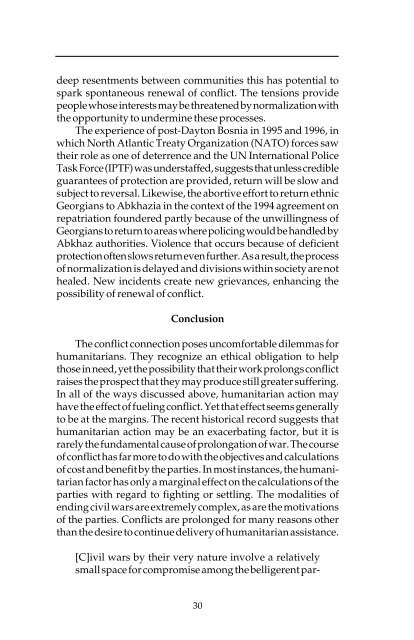Brown Cover OP 43 - The Watson Institute for International Studies
Brown Cover OP 43 - The Watson Institute for International Studies
Brown Cover OP 43 - The Watson Institute for International Studies
You also want an ePaper? Increase the reach of your titles
YUMPU automatically turns print PDFs into web optimized ePapers that Google loves.
deep resentments between communities this has potential to<br />
spark spontaneous renewal of conflict. <strong>The</strong> tensions provide<br />
people whose interests may be threatened by normalization with<br />
the opportunity to undermine these processes.<br />
<strong>The</strong> experience of post-Dayton Bosnia in 1995 and 1996, in<br />
which North Atlantic Treaty Organization (NATO) <strong>for</strong>ces saw<br />
their role as one of deterrence and the UN <strong>International</strong> Police<br />
Task Force (IPTF) was understaffed, suggests that unless credible<br />
guarantees of protection are provided, return will be slow and<br />
subject to reversal. Likewise, the abortive ef<strong>for</strong>t to return ethnic<br />
Georgians to Abkhazia in the context of the 1994 agreement on<br />
repatriation foundered partly because of the unwillingness of<br />
Georgians to return to areas where policing would be handled by<br />
Abkhaz authorities. Violence that occurs because of deficient<br />
protection often slows return even further. As a result, the process<br />
of normalization is delayed and divisions within society are not<br />
healed. New incidents create new grievances, enhancing the<br />
possibility of renewal of conflict.<br />
Conclusion<br />
<strong>The</strong> conflict connection poses uncom<strong>for</strong>table dilemmas <strong>for</strong><br />
humanitarians. <strong>The</strong>y recognize an ethical obligation to help<br />
those in need, yet the possibility that their work prolongs conflict<br />
raises the prospect that they may produce still greater suffering.<br />
In all of the ways discussed above, humanitarian action may<br />
have the effect of fueling conflict. Yet that effect seems generally<br />
to be at the margins. <strong>The</strong> recent historical record suggests that<br />
humanitarian action may be an exacerbating factor, but it is<br />
rarely the fundamental cause of prolongation of war. <strong>The</strong> course<br />
of conflict has far more to do with the objectives and calculations<br />
of cost and benefit by the parties. In most instances, the humanitarian<br />
factor has only a marginal effect on the calculations of the<br />
parties with regard to fighting or settling. <strong>The</strong> modalities of<br />
ending civil wars are extremely complex, as are the motivations<br />
of the parties. Conflicts are prolonged <strong>for</strong> many reasons other<br />
than the desire to continue delivery of humanitarian assistance.<br />
[C]ivil wars by their very nature involve a relatively<br />
small space <strong>for</strong> compromise among the belligerent par-<br />
30

















